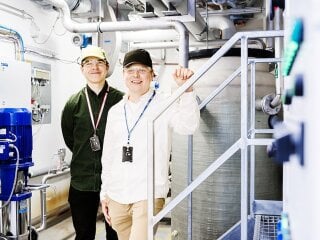Heikki Kilpeläinen, who is based at Fermion Hanko, wanted to try his hand at being a maintenance engineer and a maintenance team leader. For Kilpeläinen, who previously worked as a shift manager at Fermion, the opportunity came through job rotation.
“The decision to apply took some courage, as the new role would be quite a leap in my career. However, people in my immediate organisation encouraged me to apply and I was delighted to be selected for the job,” Kilpeläinen says.
Before writing his application, Kilpeläinen gave his previous experience and personal strengths thorough consideration. Kilpeläinen realised that he had accumulated maintenance experience at a steel mill and that he had received positive feedback for his management skills. Moreover, he had already worked at Fermion for ten years, first as an operator and then as a shift manager, so he was familiar with the company as well as its production.
Job rotation requires a good onboarding programme from the employer
Shortly after being selected, Kilpeläinen participated in his first training, although he would not start in the new role for another couple of months. Kilpeläinen shadowed an experienced maintenance engineer for a week during the summer stoppage and learnt about the new role on a practical level.
“This gave me a good head start for the new position. When the work officially started, I participated in Orion’s actual onboarding programme, which is extensive and really efficient. In addition, my nearest colleague was always ready to help, so I was never left alone to solve problems,” Kilpeläinen says.
Kilpeläinen was initially a little nervous about how his new work community would welcome him as a new team leader. He was also a little apprehensive about being able to adopt new skills and knowledge and achieve a good professional level quickly enough. His fears proved unnecessary:
“I changed roles a few months ago and I know now that there was no reason to be nervous. The job has taught me along the way, and everything has gone really well.”
Heikki also only works days now, is more motivated and feels better about his work, and has learnt plenty in a very short period of time.
New perspectives as a bonus
The maintenance team led by Kilpeläinen includes nine mechanical engineers and four electrical engineers. The task of the team is to keep the plant's machinery and equipment in working order so that the production of APIs can continue without disruptions.
“If a piece of machinery becomes faulty, we investigate the cause of the fault and repair it. With our meticulous maintenance programme, our aim is to prevent failures in advance,” says Kilpeläinen.
Heikki’s former position as shift manager has stood him in good stead, giving him insight into how to optimise the maintenance schedule. In his view, a broad perspective is useful in any work, and thanks to job rotation, he is constantly learning to see things from new perspectives.
“I really enjoyed my role as a shift manager. But in my new position, I am particularly motivated by the more extensive scope of duties. I am curious by nature and now I get to see and learn something new in many more areas.”
In his role as a maintenance engineer, Kilpeläinen is also inspired by the new networking opportunities. He is building new contacts both within and outside the organisation and company.
“Meeting new people adds interest to daily work and improves everyone’s professional expertise,” says Kilpeläinen.
Heikki Kilpeläinen’s top job rotation tips for the employer
- The motivation for job rotation always comes from the employee themselves. Their enthusiasm to learn and the appeal of a new role are the factors that drive a person to apply for job rotation. However, their enthusiasm and motivation may amount to nothing if the company's atmosphere does not encourage job rotation and the employee has to fear negative reactions from their peers and managers.
- The employer benefits from enthusiastic and highly motivated employees. Even though a person moving on to another team may cause minor disruption for the old team, the loss will be quickly remedied with a new, enthusiastic recruit.
- In the big picture, job rotation is a win-win for all: employees develop new skills and feel motivated and committed. Team chemistry benefits from such positive energy. A new pair of eyes may also be quicker to spot a new development area and to come up with new ideas and ways to do things better than before.
- Onboarding is crucial. Throwing someone into the deep end is counterproductive. Allowing a person to ease into their new role with appropriate daily support from the team leader and colleagues promotes everyone’s wellbeing and learning.











